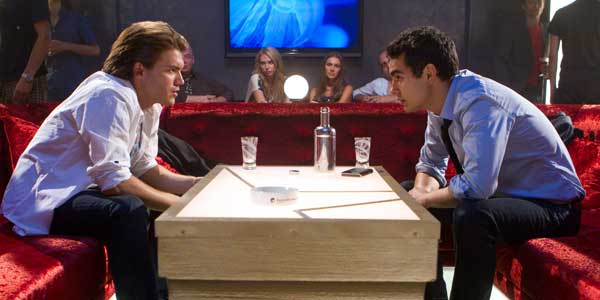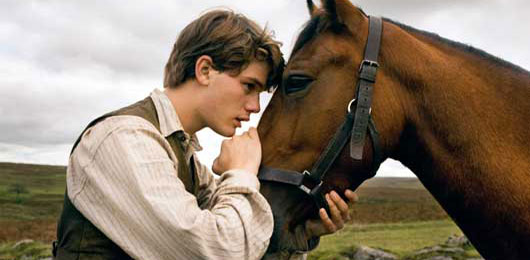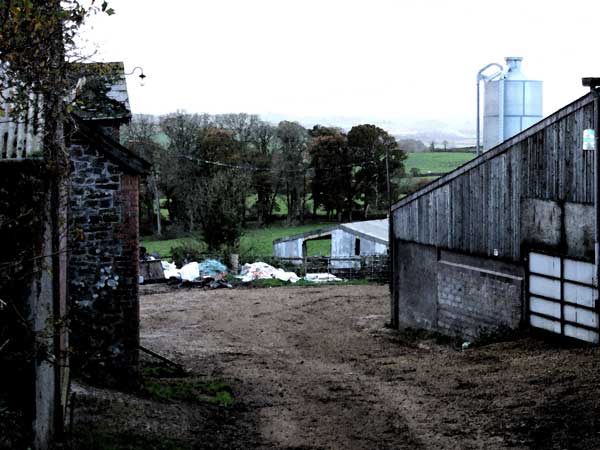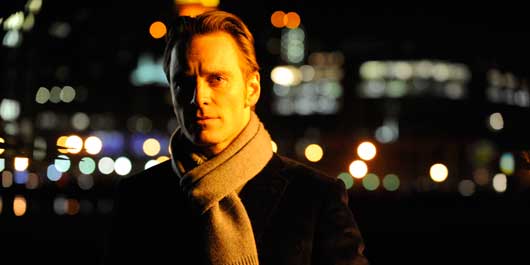
The first trailer for The Grey made it seem like someone had gotten over-excited about The Tree Of Life. It suggested the film was going to be some sort of weird, ethereal, existentialist drama. Thankfully though, that’s not what it is at all (well, it is a bit, but not too much).
Liam Neeson plays a guy whose job is to sort out the predators that occasionally menace the workers at a remote gas refinery operation in Alaska. On a plane ride with a number of other motley oil workers, things take a rather drastic turn when they fall out of the sky. Normally a plane crash would be the worst part of your day, but the men are now in the middle of nowhere and in the territory of a particularly vicious pack of wolves.
The animals don’t want the men around, and so it’s up to the survivors to try and take them out. With everything around them covered in bleak snow and ice, and with blizzards constantly threatening, it’s a pretty hairy predicament for the half a dozen men, where big-toothed animals are only one of a dozen things that could kill them at any moment.
After the hideous mess that was The A-Team, you could be forgiven for thinking that director Joe Carnahan literally doesn’t know how to make a movie. However here he pays off on some of the promise he showed a decade ago with the excellent Narc (and to a smaller extent with Smokin’ Aces).
Although the opening scenes that show the men’s lives at the oil operation are perhaps a little too slow, after that he ramps up the tension, keeps things on the edge and never lets go. I’d imagine animal charities already have press releases ready to send out saying wolves are much nicer than The Grey suggests they are, as the film does rather do a Jaws on them, taking an animal that isn’t really that much danger to humans and turning it into a ravenous killer that wants nothing more than to snack of people flesh.
As always in this sort of film, the wolves are as much metaphor as actual animals (man vs. nature, the internal struggle of life), but there will be plenty of people looking askance at anything canine-looking when they leave the cinema following The Grey.
Neeson continues what appears to be his ever-growing career bringing emotion and gravitas to movies that would otherwise lack them. As he did with Taken and Unknown, Liam manages to turn what would otherwise seem fairly portentous yet inconsequential into something you end up actually caring about. He doesn’t manage to make it a masterpiece, but he does a bloody good job of ensuring the film is exceedingly watchable.
The elements that made the first trailer seem rather Tree Of Life are present, with a slightly heavy-handed narration and a lot of musings about nature and God. The men’s internal struggles over their families and past sometimes make it seem like they might as well have a caption at the bottom of the screen saying BTW, the icy wilderness is a metaphor’. While these could have undermined the survivalist tension of the rest of the movie and it’s apparent this is what Carnahan really cares about they actually work rather well to underpin what is otherwise a pretty straightforward narrative. It certainly delivers on the visceral front and contains a few standout sequences one with wolves’ eyes appearing out of the darkness is particularly effective.
It’s not a stunningly memorable movie, but it’s entertaining, keeps you hooked and has a great turn from Liam Neeson. Plus, you get to see a man punch a wolf in the face, which may be the best animal combat moment since horse vs. gorilla in last year’s Rise Of The Planet Of The Apes.
Overall Verdict: While its attempts at metaphor are a tad heavy-handed, it’s a well put together thrill ride with plenty to keep you hooked and Liam Neeson on top form.
Reviewer: Jake Davis




 The view outside my home when I was growing up on a Devon farm
The view outside my home when I was growing up on a Devon farm
You must be logged in to post a comment.